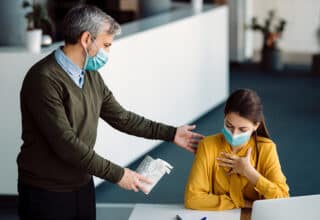We might all have heard someone say “I’m allergic to pollen” or “I can’t eat peanuts, they make me break out”. But what do people really mean when they say they have allergies? Why do some people sneeze at the smell of flowers while others can easily roll in the grass with no issues?
In this blog, we’re going to take a closer look at allergies, what they really are, their causes and symptoms, and what you can actually do about them.
What are Allergies?
Allergies are your immune system’s overreaction to something that’s normally harmless, like dust and pollen, as if it were a real threat. They cause a variety of symptoms ranging from mild to severe ones.
The substances that trigger allergies are known as “allergens”. These can be found anywhere— some are floating in the air, some hide in our food, and others are found in some common medications. When your immune system detects one, it releases chemicals such as histamine, that cause classic allergy symptoms like sneezing, rashes, swelling and more.
Common Symptoms of Allergies:
Allergies symptoms can look different for everyone. It really depends on what you are allergic to and how your body responds. Some common symptoms include:
- Sneezing
- Runny or blocked nose
- Itchy skin or a raised rash (hives)
- Itchy, red, or watery eyes
- Pain or tenderness around your cheeks, eyes, or forehead
- Swelling of lips, face, or eyes
- Shortness of breath or wheezing
- Digestive issues like nausea, vomiting, or diarrhea (especially in food allergies)
- Feeling of tiredness or fatigue
In severe cases, people may experience anaphylaxis.
What is Anaphylaxis?
It is a severe, potentially life-threatening allergic reaction that comes on quickly and requires medical attention. It can happen within seconds or minutes of exposure to the allergen.
Signs of Anaphylaxis May Include:
- A drop in blood pressure
- Difficulty breathing or wheezing
- Swelling of the throat or tongue
- Skin reactions like hives or flushing
- A rapid or weak pulse
- Dizziness or fainting
- Stomach issues like vomiting or diarrhea
- A feeling of doom
Anaphylaxis is serious and can be life-threatening. If you suspect someone is having an anaphylactic reaction, call emergency services right away. If available, use an epinephrine injection (like an Epipen).
Even if the symptoms improve, the person should be taken to the hospital for observation.
What Causes Allergies?
There is no single reason why allergies happen, but here are some common culprits:
- Pollens from trees and grass (hay fever)
- Dust mites
- Pet dander (tiny skin flakes that a pet sheds)
- Certain foods like peanuts, eggs, and milk
- Insect stings (like from bees or wasps)
- Mold spores
- Certain medicines including antibiotics and pain relievers
- Latex found in gloves or balloons
When your immune system encounters one of these allergens, it mistakenly labels it as dangerous and kicks into defense mode.
What are the Risk Factors for Allergies?
While anyone can develop allergies, some people are simply more prone to them than others.
Factors that increase your risk include:
- Family history of allergies, asthma, or eczema
- Being a child (some allergies develop in early life)
- Having asthma or another allergic condition
- Environmental factors such as pollution or diet
How are Allergies Diagnosed?
To figure out what’s causing your allergy, your doctor might use skin tests or blood tests. To decide which allergens to test for, they will ask about your symptoms and lifestyle.
Depending on what type of allergy is suspected, they will recommend other tests like breathing test, food or drug challenge test, or patch test.
Management and Treatment of Allergies:
Living with allergies can be frustrating, but thankfully there are ways to manage them. The right approach depends upon what you are allergic to and how severe are your symptoms.
1. Avoid the Triggers:
This might seem obvious, but the best way to prevent symptoms is to avoid what sets them off in the first place.
2. Medications:
There are different over-the-counter (OTC) and prescription medications that can treat your symptoms.
Depending on your symptoms, these may include:
- Antihistamines like fexofenadine or loratadine
- Steroid tablets, creams, inhalers, or nasal sprays
- Leukotriene modifiers like montelukast
For severe allergies, your doctor might recommend:
- Epinephrine auto-injectors (like Epipen) for emergency treatment of anaphylaxis
- Immunotherapy like allergy shots to gradually reduce your sensitivity to allergens
How Do You Prevent Allergies?
You may not be able to prevent allergies entirely, but there are things you can do to lower your chances and protect yourself.
- Stay away from known triggers
- If you are not sure what’s causing your allergy, keep a diary to track what you were doing or where you were, when your symptoms appeared or got worse.
- Keep indoor places clean and dust free
- Use air purifiers to reduce allergens in your home
- Wash beddings regularly in hot water to kill dust mites
- Stay indoors during high pollen seasons
- Use hypoallergenic products, especially if you have sensitive skin
When to See a Doctor:
Not every sneeze needs medical attention, but there are some signs that suggest you should see your healthcare provider.
- Your symptoms are severe or constant
- OTC medications aren’t helping
- You’re having difficulty breathing
- You’re suspecting food or medication allergy
- You have had a serious reaction in the past
- You’re not sure what’s causing your symptoms
Final thoughts:
Just because allergies are common, it doesn’t mean they are no big deal— they can impact your daily life. Understanding the cause of your allergies and how to manage it can make a big difference.
The key is to pay attention to your body, know your triggers, and don’t hesitate to seek medical help when needed.
With the right steps, most people with allergies can live a full and healthy life— without constant sneezing or scratching.








